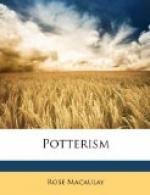’No other weeklies sell
Anything like so well.’
which was as near the truth as these statements usually are. Lord Pinkerton had, in fact, with his usual acumen, sensed the existence of a great Fourpenny Weekly Public, and given it, as was his wont, more than it desired or deserved. The sixpenny weekly public already had its needs met; so had the penny, the twopenny, the threepenny, and the shilling public. Now the fourpenny public, a shy and modest section of the community, largely clerical (in the lay sense of the word) looked up and was fed. Those brains which could only with effort rise to the solid political and economic information and cultured literary judgments meted out by the sixpennies, but which yet shrank from the crudities of our cheapest journals, here found something they could read, mark, learn, and inwardly digest.
The Potterite press (not only Lord Pinkerton’s) advanced, like an army terrible with banners, on all sections of the line.
3
Juke’s book on modern thought in the Church was a success. It was brilliantly written, and reviewed in lay as well as in church papers. Juke, to his own detriment, became popular. Canon Streeter and others asked him to collaborate in joint books on the Church. Modernist liberal-catholic vicars asked him to preach. When he preached, people came in hundreds to hear him, because he was an attractive, stimulating, and entertaining preacher. (I have never had this experience, but I assume that it is morally unwholesome.) He had to take missions, and retreats, and quiet days, and give lectures on the Church to cultivated audiences. Then he was offered the living of St. Anne’s, Piccadilly, which is one of those incumbencies with what is known as scope, which meant that there were no poor in the parish, and the incumbent’s gifts as preacher, lecturer, writer, and social success could be used to the best advantage. He was given three weeks to decide.
4
Gideon wrote long letters to Jane from the Russian towns and villages in which he sojourned. But none of them were suitable for propaganda purposes; they were critical but dispassionate. He had found some cousins of his father’s, fur merchants living in a small town on the edge of a forest. ‘Clever, cringing, nerve-ridden people,’ he said. The older generation remembered his grandparents, and his father as a bright-eyed infant. They remembered that pogrom fifty years ago, and described it. ‘They’ll describe anything,’ wrote Gideon. ’The more horrible it is, the more they’ll talk. That’s Russian, not Jewish specially. Or is it just human?’... Gideon didn’t repeat to Jane the details he heard of his grandparents’ murder by Russian police—details which his father, in whose memory they burned like a disease, had never told him.




